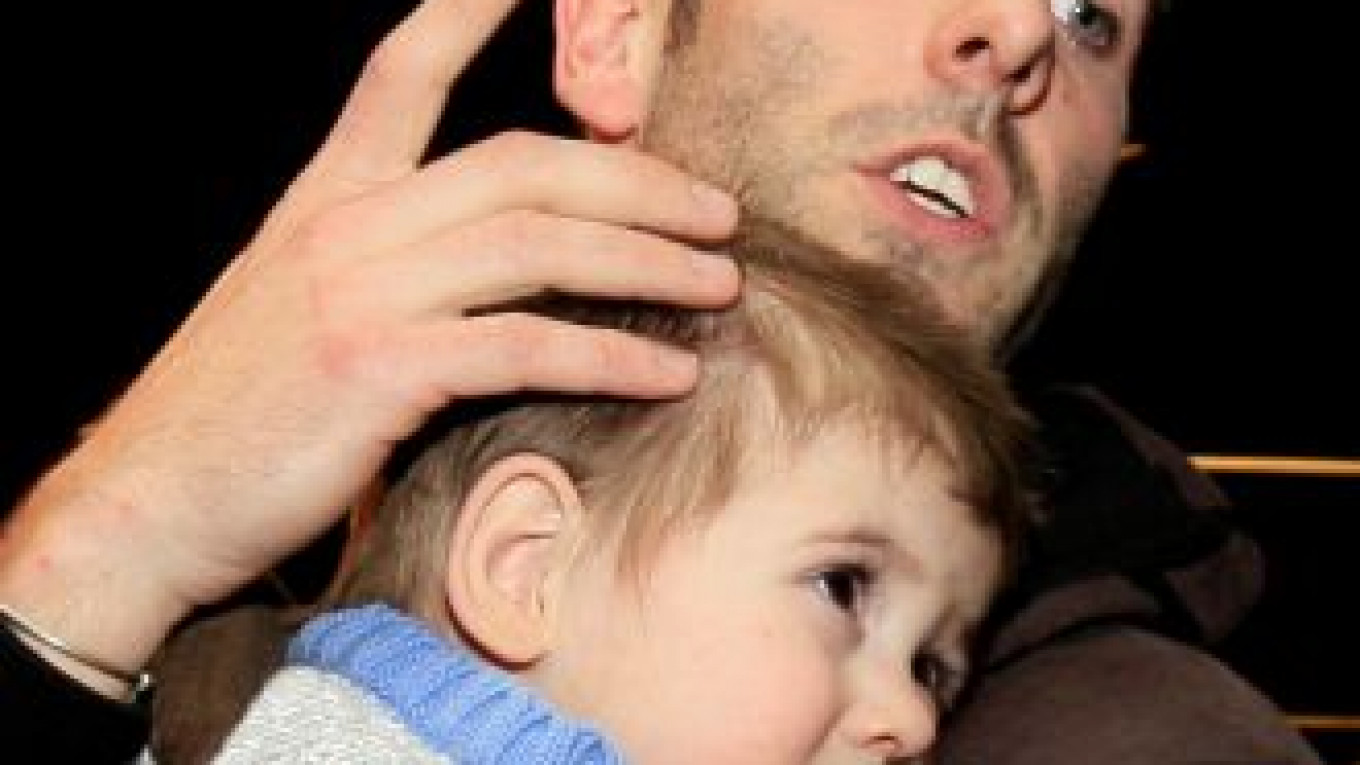BRUSSELS — A baby trapped more than two years in Ukraine by bureaucratic hurdles has arrived in Brussels with his parents, a pair of legally married Belgian men, ending the couple's long legal battle to bring their son home.
Samuel Ghilain arrived with his parents — Peter Meurrens and Laurent Ghilain — shortly after 10 p.m. Saturday to a crowd of thrilled relatives and waiting journalists.
"It has been better than we thought to see him again after one year," Meurrens said at Brussels' main airport, adding that he felt "lots of joy and relief to see him again."
"This morning was the most stressful of my life until we got the final message from Lviv in Ukraine that they passed border control and were on the plane," he said. "That was incredible."
He said the couple wept when they met the boy again at a prearranged meeting point in Warsaw and that Samuel was immediately at ease when they held him.
Samuel, now aged 2 years and 3 months, was born to a surrogate mother in Ukraine in November 2008. Meurrens and Ghilain cradled him in their arms shortly after his birth and saw him a number of times after that.
But for more than two years, bureaucratic hurdles kept the baby from being issued a Belgian passport. According to Meurrens, the problems usually seemed minor — just one more document to fill out, a missing stamp to be obtained or a translation that was deemed unacceptable.
The problems persisted until this week, when the Belgian Foreign Ministry, following a court decision in the couple's favor, finally issued Samuel a passport.
Belgian law is silent on surrogate motherhood, leaving wide room for interpretation. There is no specific legal bar to a gay couple — or any couple — using a surrogate mother abroad and bringing the child back home.
But Ghilain and Meurrens ran into continued obstacles. The couple believes that some bureaucrats, both in Ukraine and in Belgium, were anti-gay.
Belgian Foreign Minister Steven Vanackere said in a statement earlier this month that a "gap in the law" made it problematic for the country to recognize the use by Belgians of surrogate mothers in other countries. He asked for new regulations on surrogate mothers to explicitly prevent all forms of "commercial exploitation."
For lack of a passport, Samuel spent the first 16 months of his life with a foster family in Ukraine, at a cost of 1,000 euros ($1,400) a month. When Meurrens' and Ghilain's money ran out, they tried in March 2010 to smuggle the boy, who is Ghilain's biological son, out of Ukraine and failed. They had not seen him since then, until Saturday, when they were reunited in Warsaw, where he was brought by their lawyer.
After the failed attempt to spirit him out of the country, Samuel was taken to an orphanage in Lviv, where he spent almost all of the last year. Ghilain took a DNA test to prove paternity so the orphanage would not allow the boy to be adopted by some other family.
Ghilain and Meurrens plan now to take the boy to their home in a small town in southern France, where they moved before Samuel was born so he could have a quiet childhood.
A Message from The Moscow Times:
Dear readers,
We are facing unprecedented challenges. Russia's Prosecutor General's Office has designated The Moscow Times as an "undesirable" organization, criminalizing our work and putting our staff at risk of prosecution. This follows our earlier unjust labeling as a "foreign agent."
These actions are direct attempts to silence independent journalism in Russia. The authorities claim our work "discredits the decisions of the Russian leadership." We see things differently: we strive to provide accurate, unbiased reporting on Russia.
We, the journalists of The Moscow Times, refuse to be silenced. But to continue our work, we need your help.
Your support, no matter how small, makes a world of difference. If you can, please support us monthly starting from just $2. It's quick to set up, and every contribution makes a significant impact.
By supporting The Moscow Times, you're defending open, independent journalism in the face of repression. Thank you for standing with us.
Remind me later.






